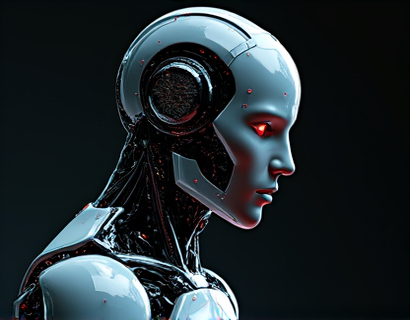AI-Powered Software: Unleashing Digital Business Potential Through Advanced Automation and Data Insights
In the rapidly evolving digital landscape, businesses are increasingly turning to AI-powered software to gain a competitive edge. This technology is not just a trend but a transformative force that is reshaping how companies operate, make decisions, and drive growth. By leveraging advanced automation and data insights, AI-powered software is enabling digital businesses to streamline processes, enhance efficiency, and unlock new opportunities for strategic expansion.
The integration of AI into business operations has become essential for staying relevant and successful in today's market. AI-powered tools offer a range of capabilities that traditional software cannot match, from predictive analytics and natural language processing to machine learning and robotic process automation. These capabilities are crucial for businesses looking to optimize their workflows, reduce costs, and improve customer experiences.
Automation: The Backbone of Efficiency
One of the most significant benefits of AI-powered software is its ability to automate repetitive and time-consuming tasks. Automation through AI can handle a wide array of functions, from data entry and report generation to customer service and supply chain management. By automating these processes, businesses can free up valuable human resources to focus on higher-value activities that require creativity, critical thinking, and emotional intelligence.
Robotic Process Automation (RPA) is a key component of AI-driven automation. RPA uses software robots to mimic human actions in digital environments, performing tasks such as data extraction, transaction processing, and system interactions. This not only speeds up operations but also reduces the risk of human error, ensuring higher accuracy and consistency in business processes.
Enhanced Decision-Making with Data Insights
AI-powered software goes beyond automation by providing deep data insights that inform strategic decision-making. Advanced analytics tools can process vast amounts of data from various sources, identifying patterns, trends, and insights that would be impossible for humans to detect manually. These insights enable businesses to make data-driven decisions, optimize resource allocation, and identify new market opportunities.
Predictive analytics is a powerful feature of AI-driven data insights. By analyzing historical data and current trends, predictive models can forecast future scenarios with a high degree of accuracy. This allows businesses to anticipate market changes, customer behaviors, and operational challenges, enabling proactive rather than reactive strategies.
Personalized Customer Experiences
In the digital age, customer experience is paramount. AI-powered software can significantly enhance customer interactions by delivering personalized and seamless experiences. Chatbots and virtual assistants, powered by natural language processing, can handle customer inquiries 24/7, providing instant responses and support. These tools can also analyze customer data to offer tailored recommendations, promotions, and content, increasing customer satisfaction and loyalty.
Moreover, AI-driven analytics can help businesses understand customer preferences and behaviors in real-time. By segmenting customers based on their interactions and purchasing patterns, companies can create targeted marketing campaigns that resonate more effectively, leading to higher conversion rates and increased revenue.
Operational Efficiency and Cost Reduction
AI-powered software is not only about enhancing customer experiences and decision-making; it is also a powerful tool for improving operational efficiency and reducing costs. By automating routine tasks and optimizing processes, businesses can achieve significant cost savings. For instance, AI can streamline inventory management by predicting demand and optimizing stock levels, reducing overstocking and stockouts.
AI-driven maintenance solutions can predict equipment failures before they occur, allowing for timely repairs and minimizing downtime. This predictive maintenance approach not only saves money but also extends the lifespan of machinery and equipment. Additionally, AI can optimize energy consumption in facilities, further reducing operational costs and environmental impact.
Scalability and Flexibility
One of the key advantages of AI-powered software is its scalability and flexibility. As businesses grow and evolve, AI solutions can adapt to changing needs without requiring extensive reconfiguration. This scalability ensures that companies can continue to benefit from advanced automation and data insights regardless of their size or industry.
AI-powered platforms can integrate seamlessly with existing systems and workflows, making it easier for businesses to adopt and implement new technologies. This flexibility is particularly important in today's fast-paced market, where the ability to pivot and adapt quickly can mean the difference between success and failure.
Challenges and Considerations
While the benefits of AI-powered software are clear, there are also challenges and considerations that businesses must address. One of the primary concerns is the integration of AI into existing systems and processes. This requires careful planning and execution to ensure a smooth transition and maximize the benefits of the new technology.
Data quality and security are critical factors as well. AI systems rely on high-quality, accurate data to produce reliable insights and automate processes effectively. Ensuring data integrity and implementing robust security measures are essential to protect sensitive information and maintain customer trust.
Another consideration is the need for skilled personnel to manage and maintain AI systems. While AI can automate many tasks, it also requires expertise in data science, machine learning, and AI ethics. Businesses must invest in training and hiring professionals who can leverage AI technology to its full potential.
Future Trends and Innovations
The field of AI is rapidly evolving, with new innovations and trends emerging regularly. One such trend is the development of more sophisticated machine learning models that can learn from smaller datasets and require less computational power. This democratization of AI technology makes it more accessible to businesses of all sizes, further accelerating its adoption across industries.
Another exciting area is the integration of AI with other emerging technologies such as the Internet of Things (IoT), blockchain, and augmented reality. These combinations can lead to innovative solutions that enhance operational efficiency, security, and customer engagement in ways previously unimaginable.
As AI continues to advance, we can expect to see even more intelligent and autonomous systems that can handle complex tasks with minimal human intervention. The future of AI-powered software holds tremendous potential for transforming digital businesses and driving unprecedented growth and innovation.











































